Removal Procedure
Tools Required
| • | J 28467-A Engine Support Fixture |
| • | J 28467-450 Engine Support Fixture Adapter |
| • | J 36857 Lift Brackets |
- Disconnect the negative battery cable.
- Drain the coolant. Refer to Cooling System Draining and Filling .
- Remove the wiper arms. Refer to Windshield Wiper Arm Replacement in Wipers Wash Systems.
- Remove the air inlet grilles. Refer to Air Inlet Grille Panel Replacement .
- Remove the hood. Refer to Hood Replacement .
- Remove the battery. Refer to Battery Replacement .
- Recover the refrigerant. Refer to Refrigerant Recovery and Recharging in HVAC with Automatic A/C.
- Disconnect the wiring connectors (1).
- Remove the body ground wire from the negative battery cable end.
- Siphon the power steering fluid from the power steering reservoir.
- Remove the power supply wires from the battery positive cable end.
- Release the power steering suction hose clamp and remove the power steering suction hose.
- Remove the power steering discharge hose fitting (a crow's foot wrench works best) from the power steering pump.
- Remove the brake booster threaded vacuum fitting from the intake plenum (1).
- Remove the vacuum hoses (2) from the brake power booster hose.
- Remove the intake plenum switchover valve electrical connection.
- Remove the intake plenum switchover valve vacuum hose.
- Remove the intake plenum switchover valve bolts.
- Remove the intake plenum switchover valve. (Removal of the valve prevents damage from the lift chain when removing the engine.)
- Unclip the ECM from the underhood electrical center.
- Unclip the relays from the electrical center box to enable removal of the entire wiring harness (ECM Included) from the electrical center.
- Disconnect the large blue and white wiring harness connectors (1).
- Drape the entire wiring harness over the top of the engine and secure to prevent interference when removing the engine.
- Remove the accelerator cable retaining clip (3).
- Remove the accelerator cable (2) from the throttle body.
- Remove the cruise control cable retaining clip (1).
- Remove the cruise control cable from the throttle body.
- Relieve the fuel system pressure. Refer to Fuel Pressure Relief .
- Disconnect the fuel supply hose connection.
- Disconnect the fuel return hose connection.
- Release the coolant return hose clamp and remove the hose from the throttle body.
- Remove the vacuum hose from the purge valve located on top of the engine ventilation chamber. (The engine ventilation chamber is located on the rear, passenger side of the engine.)
- Remove the vacuum hose from the hot water control valve.
- Release the coolant reservoir hose clamp and remove the hose from the coolant intake pipe.
- Disconnect the heater hose quick connects from the heater core pipes. (Press the tabs and pull back on the sleeve to unlock, then carefully pull back to remove. It is possible to reach the quick connects through the access cover, near the HVAC pollen filter). Discard the green plastic assembly markers if applicable.
- Remove the intake air resonator. Refer to Intake Air Resonator Replacement in Engine Controls.
- Remove the radiator. Refer to Radiator Replacement .
- Remove the A/C compressor/condenser (HP) hose bracket screws where the bracket connects near the driver's side frame rail.
- Reposition the A/C compressor/condenser (HP) hose and bracket to allow for extra clearances when removing the engine.
- Disconnect the quick-connect near the high pressure service fitting.
- Disconnect the quick-connect near the low pressure service fitting.
- Install the J 28467-A , the J 28467-450 and the J 36857 .
- Raise and support the vehicle. Refer to Lifting and Jacking the Vehicle in General Information.
- Remove the splash shield bolts.
- Remove the splash shield.
- Disconnect the A/C compressor electrical connector.
- Remove the transmission. Refer to Transmission Assembly in Automatic Transmission.
- Remove the engine mount nuts.
- Lower the vehicle.
- Connect the engine lift chains to the three support lift shackles.
- Remove the J 28467-A Engine Support Fixture after the engine lift has assumed the weight of the engine.
- Remove the engine. Note the positioning of the motor mount guide pins.
Caution: Unless directed otherwise, the ignition and start switch must be in the OFF or LOCK position, and all electrical loads must be OFF before servicing any electrical component. Disconnect the negative battery cable to prevent an electrical spark should a tool or equipment come in contact with an exposed electrical terminal. Failure to follow these precautions may result in personal injury and/or damage to the vehicle or its components.
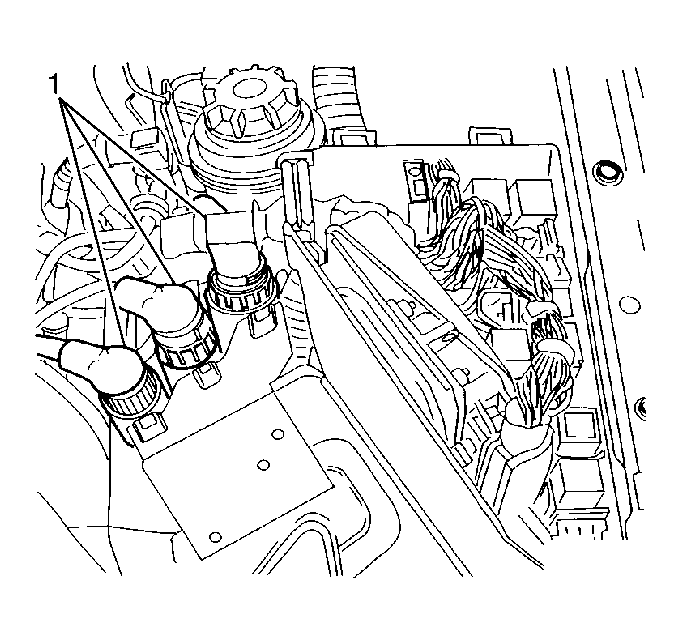
Important: Tag all of the wires removed to prevent improper reinstallation.
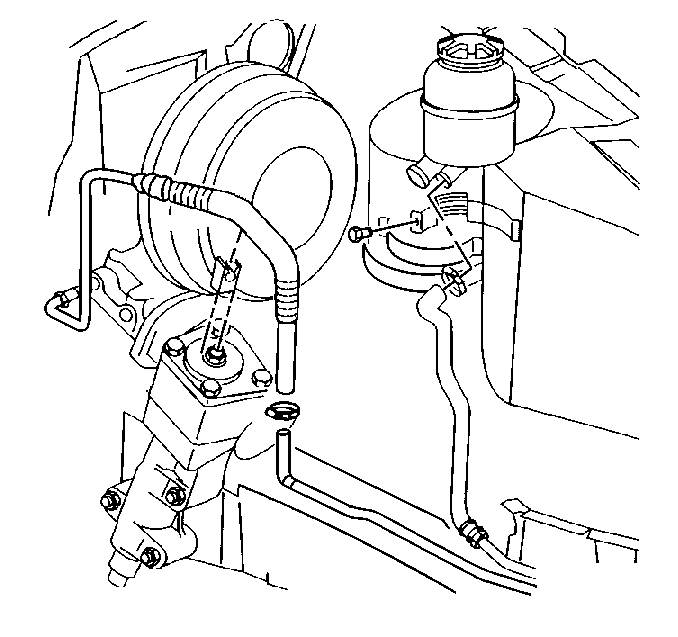
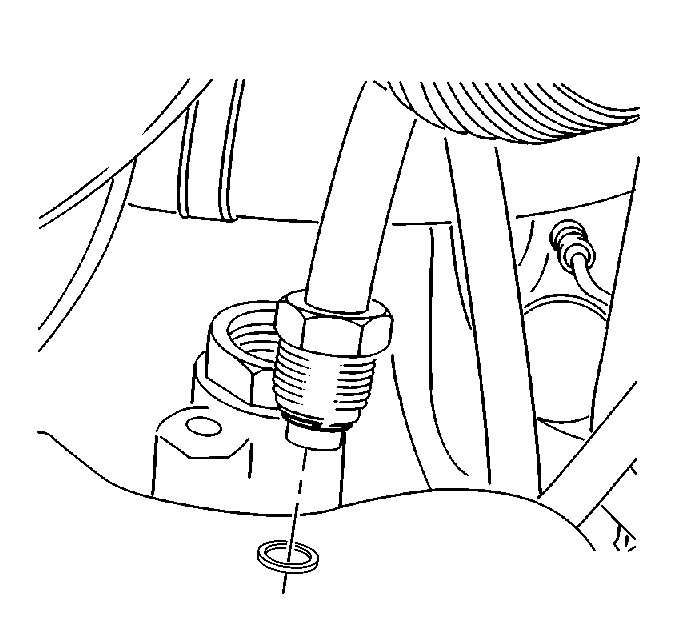
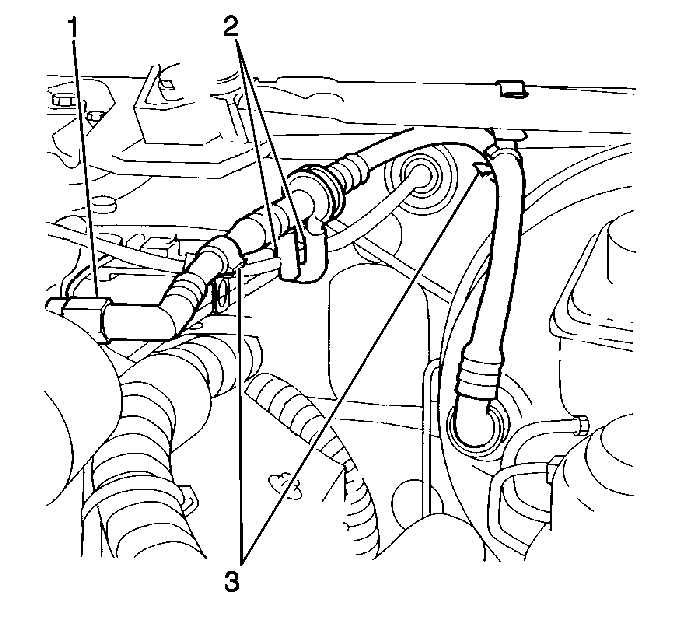
Important: Tag all of the vacuum hoses to aid in reassembly.


Important: Counterhold the fuel supply hose connection to prevent damage to the fuel rail.
Residual fuel may be present in the supply hose, provide a means to capture fuel if necessary.Important: Counterhold the fuel return hose connection to prevent damage to the fuel rail.
Residual fuel may be present in the return hose, provide a means to capture fuel if necessary.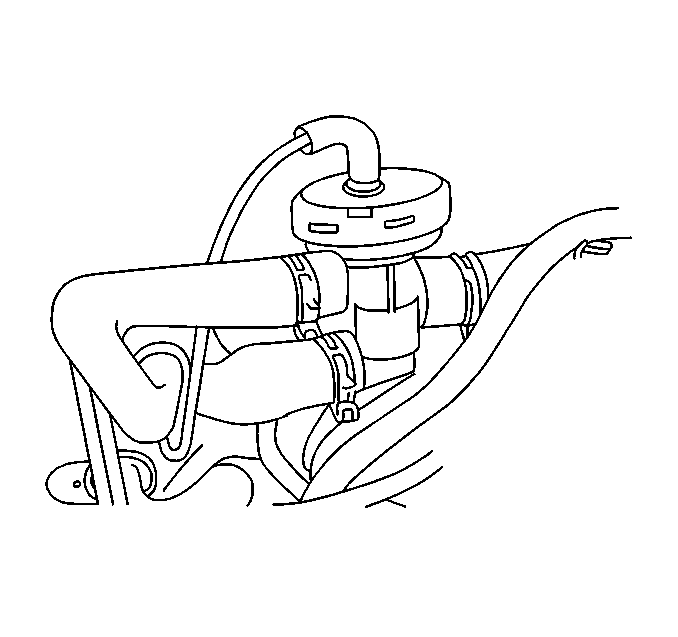
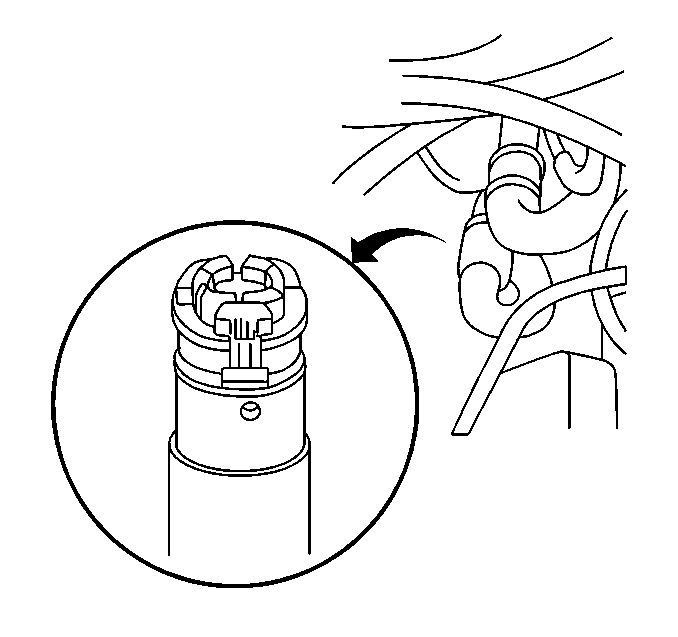
Important: Use care with the locking tabs on the quick connects, they break easily.
Important: Support the engine whenever the transmission is removed. The engine mounts are silicone filled and do not provide sufficient rigidity to prevent the engine from falling forward or backward with the transmission removed.
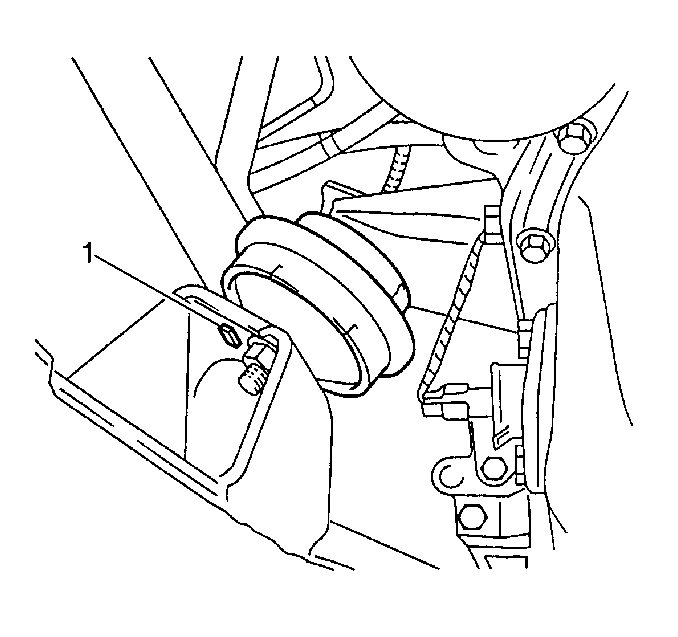
Installation Procedure
- Install the engine.
- After the engine is in place, install the J 28467-A Engine Support Fixture.
- Remove the engine lift chains from the three support lift shackles.
- Raise and support the vehicle. Refer to Lifting and Jacking the Vehicle .
- Ensure the guide pins (1) are in place and install the engine mount nuts.
- Install the transmission. Refer to Transmission Assembly in Automatic Transmission.
- Install the A/C compressor electrical connector.
- Install the splash shield.
- Install the splash shield bolts.
- Lower the vehicle.
- Remove the J 28467-A Engine Support Fixture.
- Connect the quick-connect near the low pressure service fitting.
- Connect the quick-connect near the high pressure service fitting.
- Position the A/C compressor/condenser (HP) hose and bracket.
- Install the A/C compressor/condenser (HP) hose bracket screws where the bracket connects near the driver's side frame rail.
- Install the radiator. Refer to Radiator Replacement .
- Install the intake air resonator. Refer to Intake Air Resonator Replacement in Engine Controls.
- Install the heater hose quick connects to the heater core connections.
- Install the coolant reservoir hose and clamp to the coolant intake pipe.
- Install the vacuum hose to the hot water control valve.
- Install the vacuum hose to the purge valve located on the engine ventilation chamber.
- Install the coolant return hose and clamp to the throttle body.
- Install the fuel supply hose.
- Install the fuel supply hose connection.
- Install the fuel return hose.
- Install the fuel return hose connection.
- Install the cruise control cable to the throttle body.
- Install the cruise control cable retaining clip (1).
- Install the accelerator cable (2) to the throttle body.
- Install the accelerator cable retaining clip (3).
- Install the large blue and white wiring harness connectors (1).
- Install the wiring harness to the electrical center box and clip the relays in place.
- Install the ECM and secure in place.
- Install the intake plenum switch-over valve.
- Install the intake plenum switch-over valve bolts.
- Install the intake plenum switch-over valve vacuum hose.
- Install the intake plenum switch-over valve electrical connection.
- Install the vacuum hoses to the brake power booster hose.
- Install the brake booster threaded vacuum fitting (1) to the intake plenum.
- Install the power steering pump discharge hose to the power steering pump.
- Install the power steering suction hose and clamp.
- Install the four power supply wires to the battery positive cable end.
- Install the body ground wire to the battery negative cable end.
- Connect the large black wiring harness connectors (1).
- Install the air inlet grilles. Refer to Air Inlet Grille Panel Replacement .
- Install the wiper arms. Refer to Windshield Wiper Arm Replacement in Wipers Wash Systems.
- Install the hood. Refer to Hood Replacement .
- Install the battery. Refer to Battery Replacement .
- Reconnect the negative battery cable.
- Fill the power steering system. Refer to Checking and Adding Power Steering Fluid .
- Fill and bleed the cooling system. Refer to Cooling System Draining and Filling .
- Reprogram the applicable accessories.
- Recharge the A/C system. Refer to Refrigerant Recovery and Recharging in HVAC with Automatic A/C.
- Leak check the A/C system. Refer to Leak Testing in HVAC with Automatic A/C.

Notice: Use the correct fastener in the correct location. Replacement fasteners must be the correct part number for that application. Fasteners requiring replacement or fasteners requiring the use of thread locking compound or sealant are identified in the service procedure. Do not use paints, lubricants, or corrosion inhibitors on fasteners or fastener joint surfaces unless specified. These coatings affect fastener torque and joint clamping force and may damage the fastener. Use the correct tightening sequence and specifications when installing fasteners in order to avoid damage to parts and systems.
Tighten
Tighten the lower engine mount nuts to 55 N·m
(41 lb ft).
Tighten
Tighten the splash shield bolts until fully seated. Do not strip the
splash shield bolts.
Tighten
Tighten the A/C compressor/condenser hose bracket screws to 8 N·m
(71 lb in).

Important: Ensure the quick connects are fully seated and that the retaining sleeves are pushed in to the locked position.

Important: Counterhold the fuel supply hose connection to prevent damage to the fuel rail.
Tighten
Tighten the fuel supply hose connection to 15 N·m (11 lb ft).
Important: Counterhold the fuel return hose connection to prevent damage to the fuel rail.
Tighten
Tighten the fuel return hose connection to 15 N·m (11 lb ft).


Tighten
Tighten the intake plenum switch-over valve bolts to 8 N·m
(71 lb in).

Tighten
Tighten the brake booster threaded vacuum fitting until fully seated.
Do not strip the brake booster threaded fitting.

Tighten
Tighten the power steering pump discharge hose connection to 28 N·m
(21 lb ft).


